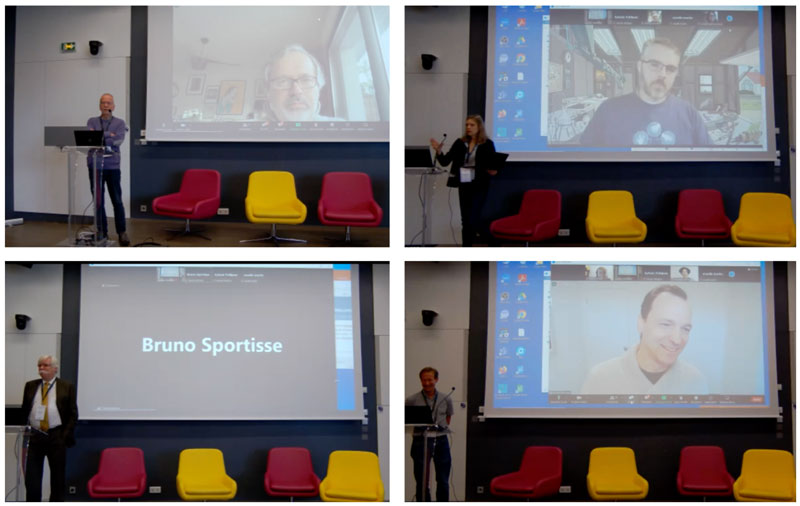by Anaëlle Martin (CNPEN/CCNE)
The ERCIM Ethics Working Group organised jointly with Inria (the French National Institute for Research in Digital Science and Technology) and the CNPEN (the French National Pilot Committee for Digital Ethics) a forum targeted at scientists and Research Ethics Boards on 17-18 October 2022 in Paris.
This successful event, which brought together researchers interested in ethics of digital and connected technologies, consisted of keynotes, presentations and tutorials, and provided ample space for interactive sessions and open discussions. The participants from all over the world, and from different fields of research (computer science, robotics, philosophy of technology, research integrity, ethics and law) met in Paris and online on the 17th and 18th of October to discuss ethical challenges resulting from interactions between humans and technologies in fields related to research involving ICT. The aim of this workshop was to provide a forum for researchers in digital sciences who face tough ethical questions in their daily activity for which there are not yet consensual answers among the research community. Research in digital sciences raises many new ethical issues such as the use of “autonomous” robots (human responsibility, agency and oversight), the use of data (which raises privacy concerns), the negative impacts of AI systems in terms of discrimination, bias, lack of robustness and reliability, and also the transformative impact of disruptive technologies on society and work. In order to achieve scientific excellence and public trust, a responsible conduct of research in science and engineering is needed. Although some efforts have been made, the situation is far from satisfactory, and more progress needs to be made. On the one hand, it is important to train and raise awareness among researchers, as many are either ill-informed or reluctant to deal with potential ethical implications of their work. On the other hand, it is crucial to consider the current research framework that seems ill-suited to address all the risks and acute concerns about research ethics and research integrity.

Claude Kirchner (top left), Catherine Tessier (top right) and Andreas Rauber (bottom right) chairing the keynotes and sessions; Björn Levin (bottom left) addressing the audience.
Ethical issues arise from the intersections of business, technology, and information such that the whole digital ecosystem must be taken into account, including stakeholders such as entrepreneurs, users and scientists from fields other than digital sciences, applied mathematics and computer science. In addition, there must be appropriate trade-offs between innovation, ethics, regulation and compliance, since the current digital model is no longer sustainable. Last but not least, if we do not promote “digital sovereignty” in Europe and an operational agenda, there will be no alternatives to the GAFAM or Chinese models. Therefore, agenda for digital sovereignty and agenda for digital ethics should be deeply connected. To meet this ambitious program, the seminar consisted of six sessions devoted to research ethics from the perspective of cross-disciplinary and global setting, review, training, big data and AI, new challenges and opportunities, as well as a tutorial on research ethics for young researchers. Over two days, about 15 researchers spoke on issues relating to governance of AI, research ethics guidelines for the computer sciences, responsible innovation in a neuroinformatics project, ethics reviews in modern research, challenges of ethics oversight in digital science, the limits of human subjects review, research accountability in machine learning, ethics reflection as a precondition to research funding, teaching and research ethics training, open science, data trusts and the search for anonymous data. Each of the speakers made a high-quality contribution based on their academic work and personal experience in the field of research ethics or research integrity (as a researcher and/or teacher). Many suggestions were made and some outcomes may be directed towards policy makers. In addition to dealing with core issues such as human rights violation (but also environment well-being and animal welfare in the case of bee-robots) the workshop addressed epistemological and methodological issues. The tutorial addressed the distinction between morality, ethics, deontology and law. The exchanges with the audience allowed to deepen other conceptual distinctions, such as research ethics and research integrity, but also scientific soundness. Indeed, some highly publicised studies, often pointed out by the speakers, are questioning the boundary between the scientific quality of research and its ethical impact. One could almost argue that when we have some ethics research controversy, it is often based on “bad science”, which is likely to undermine the public trust in science.
Despite its success, this seminar is not sufficient to fill the gaps in research ethics. There is a need in Europe for more events of this kind focusing not just on digital ethics but on research ethics for digital scientists. The richness of the contributions of that forum on digital ethics was due to their interdisciplinarity and to the international backgrounds of the speakers. We therefore need a series of other workshops of the same type dedicated to research ethics, especially of cross-disciplinary research like digital humanities research. To conclude, it is worth highlighting a message underpinning many of the speeches throughout the two days of the conference: Europe, and more specifically the European Union, has a duty to provide answers to the many questions raised by researchers and scientists. It needs to adopt a doctrine in line with its values and its vision of human rights. If not, European states will be condemned to follow the path decided by the United States or by other public or private actors.
More information:
https://www.ercim.eu/beyond-compliance
The recorded presentations are available on a Youtube channel.











